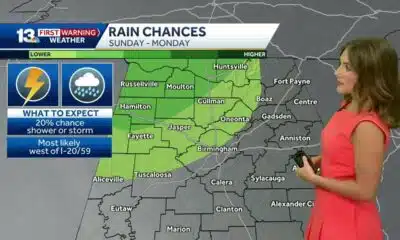News from the South - North Carolina News Feed
With high fire hazards, why no prescribed burns yet? What’s with the 5 p.m. early voting cutoff? Why can’t the city tap into the Biltmore Estate’s reservoir? • Asheville Watchdog
Today’s round of questions, my smart-aleck replies and the real answers:
Question: We know U.S. Forest Service employees have been hard at work opening roads, recreation areas and trails (and we thank them) on the Nantahala and Pisgah National Forests. But with all the hazardous fuel (trees) now on the ground, what are they doing to mitigate this added risk for future wildfires? We haven’t had rain in weeks, which has been a blessing to recovery efforts, but are they concerned about this fall fire season? Next spring? What steps are being taken, and what do we need to know?
My answer: If there is a prescribed burn anywhere, could someone please come take away my busted fence and toss it on the fire?
Real answer: Tropical Storm Helene undoubtedly felled hundreds of thousands, if not millions, of trees in western North Carolina. It was a slaughter.
Adam Rondeau, public affairs officer with the U.S. Forest Service’s National Forests in North Carolina, noted that Helene “left a significant amount of downed trees and woody debris across much of the area’s forestland, including on both the Nantahala and Pisgah National Forests, leaving us with higher-than-usual levels of fuel on the ground.

“This, combined with the dry conditions we’ve experienced over the last few weeks, creates a heightened risk of wildfires,” Rondeau said. “As we head into peak fall fire season, we’re identifying available assets, such as firefighting crews, heavy equipment and aircraft, which can be called up at a moment’s notice if the need arises.”
The Forest Service is also “already evaluating plans for the next prescribed burning season when weather conditions are more favorable,” Rondeau said.
The prescribed fire season usually begins in late January or early February in western North Carolina when weather conditions are favorable, then picks up in March, he said.
The North Carolina Forest Service, part of the state Department of Agriculture & Consumer Services, is also keeping a close eye on the forest fire danger, according to spokesperson Philip R. Jackson. The Asheville area has had almost no rain since Helene struck Sept. 27.
The N.C. Forest Service is the lead agency for wildfire response on state and privately owned or managed land, and Jackson said the service “has and will continue urging North Carolinians to be careful and responsible with outdoor fire…”
He provided a list of recommendations and stressed how important they are, as this is a prime season for wildfires (see below).
“As the weather has remained dry over the last several weeks since Hurricane Helene, it’s imperative that folks adhere to the guidance to help reduce the number of new fire starts by minimizing ignition sources,” Jackson said, adding, “Especially with the added fuel of down trees and storm debris in western NC.”
“Folks choosing to burn need to refrain from doing so on dry, windy days, especially as relative humidity levels decrease this time of year,” Jackson said, noting that you should stay with a set fire until it’s completely out. “Even if your fire area is no longer showing flames, as long as it continues to smolder, hiss, crackle and pop, heat is still present, and as long as the heat source remains present, so does the risk for reignition, escape and becoming a wildfire.”
Kelley Klope, spokesperson for the Asheville Fire Department, said firefighters are particularly concerned about wildfires from October through early December, and all the Helene debris adds to that concern. Open burning is illegal inside city limits.
“Common ignition sources like backyard debris burning, arson, escaped campfires, and the use of machinery and vehicles can lead to human-caused wildfires,” Klope said.
Around here, we have what’s known as the “wildland-urban interface, where developed areas meet wildlands,” Klope said.
“This poses significant risks, especially as rapid population growth pushes more people into once-rural regions, increasing wildland-urban interface acreage,” Klope said. “In fact, three of the top four states with the most homes near wildlands are in the South, including North Carolina.”
Klope said that as of 2020, more than half of North Carolina’s population lives in such areas.
Klope also recommended the Firewise USA program, a voluntary framework that helps communities reduce wildfire risks and increase the ignition resistance of homes.
The North Carolina Forest Service reminds us that human activity causes 99 percent of forest fires. In 2023, the service responded to nearly 2,000 wildfires from October through December, including more than 1,200 in November alone.
So with that in mind, here are the tips from the N.C. Forest Service:
- Make sure you have a valid burn permit. You can obtain a permit at any N.C. Forest
- Service office or authorized permitting agent, or online at https://www.ncforestservice.gov/burnpermit.
- Check the weather. Never burn on dry, windy days.
- Keep your fire small, not tall.
- Be sure you are fully prepared before burning. To control the fire, you will need a wate hose, bucket, steel rake and a shovel for tossing dirt on the fire. Keep a phone nearby, too.
- Never use kerosene, gasoline, diesel fuel or other flammable liquids to speed up burning.
- Douse burning charcoal briquettes or campfires thoroughly with water. Drown all embers, not just the red ones. When soaked, stir the coals and soak them again. Make sure everything is wet and that embers are cold to the touch. If you do not have water, mix enough dirt or sand with the embers to extinguish the fire, being careful not to bury the fire. Never dump hot ashes or coals into a wooded area.
- Never leave your fire. Stay with it until it is completely out.
Finally, check with your municipality or county before burning.

Question: Did you see that the Democrats on the board of elections voted last week to continue to keep early voting closing at 5 p.m.? That should be reported on. We are the only county doing this. Other counties hit hard by Helene are staying open until 7:30 p.m. It’s upset a lot of people, and this is the sort of thing that plants seeds of doubt with a form of voter suppression. Polls throughout our state and country are all manned by retired folks, so perhaps they should stay open so that shift workers and people who work on weekends can come in later.
My answer: Hey, I live in Henderson County, where the geniuses on the Board of Elections had the brilliant idea of having just one early voting site. Then when the state forced them to open more, they had two voting machines for the entire Town of Fletcher. It took me two hours to vote. I know, first world problem, but where has common sense gone?
Real answer: Buncombe County spokesperson Lillian Govus said the Board of Elections on Oct. 8 “approved a new early voting plan in response to the devastation from the storm.” The previous plan was approved May 21 “and included locations that were no longer safe/accessible after the storm.
“The new plan includes longer hours on Saturdays, and an additional day of Sunday voting as compared to previous years,” Govus said. “The Board of Elections will not be taking on changing hours the last week of early voting. It was considered last week; however, ultimately the board did not approve changing hours.”
Govus said Board Chair Jake Quinn cited these reasons:
- Confusion after having to delay the absentee ballot mailing due to having to print ballots without the “We the People” party candidates.
- While early voting officials were trained ahead of the storm, a quarter were no longer available to work after the storm.
- Unsafe road conditions after dark for voters and poll workers.
- Having to change 17 of 80 election day precincts and the associated logistical, administrative, and communication challenges.
While I doubt the change is curtailing the rural vote, as some have claimed, I certainly hope the board goes back to the 7:30 p.m. closing time for the next election. This system really does create a problem for working people.

Corinne Duncan, Buncombe County’s director of elections, also addressed an early voting question at the Oct. 31 daily county Helene briefing. She echoed the comments of Govus and Quinn, noting that once the storm hit, the State Board of Elections “knew that the western counties might have challenges with the plans that were approved by the State Board and the county boards, and so they put in more flexibility into the plans to be able to build new plans.
With roads, water and power out, some sites, such as fire stations, could not be used, Duncan noted. They also had concerns about poll workers.
“We didn’t have as many early voting poll workers available to us as we did before the storm, so staff produced a plan that we knew that we would be able to implement,” Duncan said. “That included a reduction of hours during the week and then an expansion of hours and an additional day during the weekend.”
They proposed that to “make sure that staff and poll workers would be able to safely get home” in the evenings, and because communication, initially, was problematic.
“Communication has improved drastically since the time that the plan was proposed, but we really wanted to make sure that with these changes so close to early voting, that we were able to communicate the change as well,” Duncan said. “So being able to say ‘nine to five every single day,’ including the weekends, was advantageous.”
She noted that the board reviewed the plan and passed it unanimously. The plan also went to the State Board of Elections for approval.
A reminder that Election Day, mercifully, is Tuesday, Nov. 5. Polls will be open from 6:30 a.m. to 7:30 p.m.

Question: Has the city asked the Biltmore Estate if it can tap into the Busbee Reservoir? Has the estate offered this? How much could it boost available water?
My answer: If I lived in Asheville, I would’ve drilled a well Sept. 28.
Real answer: The Biltmore Estate does own the Busbee Reservoir a couple of miles from the estate, but it’s not the estate’s drinking water supply. As I reported in February 2023, until the 1980s, the estate used the Busbee Reservoir and a 2.2-mile long water line that conveyed water to the Lone Pine Reservoir on a hill above the Biltmore House.

But new regulations required the estate to connect to the city of Asheville’s water system in the 1980s.
“Growth of the estate, demands for additional water supply, and the dependence on a single water supply line from Asheville to the Estate raised concerns of vulnerability,” McGill Associates stated in a 2021 news release about work it did for the estate. The company drilled wells for the estate that augment its water supply and can provide water in the event of a city outage.
I sent this question to the Biltmore Estate but did not hear back by deadline. The estate said previously it uses water from its reservoirs only for irrigation.
Asheville Water Resources Department spokesperson Clay Chandler responded for the city via email.
“The short answer is that it is not feasible for the city to use water from the Biltmore Estate,” “Availability of water is not the primary problem. It’s the treatability of the available supply.”
Also, Chandler said if the city were to introduce treated water into the system “from a source other than North Fork, there is no guarantee the two sources wouldn’t eventually mix somewhere in our distribution system.”
The city’s main source of water, North Fork Reservoir in Black Mountain, sustained washouts to the two primary lines coming out of the plant, as well as a backup, leaving the city’s 63,000 customers with no water for weeks. The city repaired the bypass line and is now providing chlorinated water from the lake, but it is not potable.
Asheville Watchdog is a nonprofit news team producing stories that matter to Asheville and Buncombe County. Got a question? Send it to John Boyle at jboyle@avlwatchdog.org or 828-337-0941. His Answer Man columns appear each Tuesday and Friday. The Watchdog’s reporting is made possible by donations from the community. To show your support for this vital public service go to avlwatchdog.org/support-our-publication/.
Related
The post With high fire hazards, why no prescribed burns yet? What’s with the 5 p.m. early voting cutoff? Why can’t the city tap into the Biltmore Estate’s reservoir? • Asheville Watchdog appeared first on avlwatchdog.org
News from the South - North Carolina News Feed
White House officials hold prayer vigil for Charlie Kirk
SUMMARY: Republican lawmakers, conservative leaders, and Trump administration officials held a prayer vigil and memorial at the Kennedy Center honoring slain activist Charlie Kirk, founder of Turning Point USA. Kirk was killed in Utah, where memorials continue at Utah Valley University and Turning Point USA’s headquarters. Police say 22-year-old Tyler Robinson turned himself in but has not confessed or cooperated. Robinson’s roommate, his boyfriend who is transitioning, is cooperating with authorities. Investigators are examining messages Robinson allegedly sent on Discord joking about the shooting. Robinson faces charges including aggravated murder, obstruction of justice, and felony firearm discharge.
White House officials and Republican lawmakers gathered at the Kennedy Center at 6 p.m. to hold a prayer vigil in remembrance of conservative activist Charlie Kirk.
https://abc11.com/us-world/
Download: https://abc11.com/apps/
Like us on Facebook: https://www.facebook.com/ABC11/
Instagram: https://www.instagram.com/abc11_wtvd/
Threads: https://www.threads.net/@abc11_wtvd
TIKTOK: https://www.tiktok.com/@abc11_eyewitnessnews
News from the South - North Carolina News Feed
Family, friends hold candlelight vigil in honor of Giovanni Pelletier
SUMMARY: Family and friends held a candlelight vigil in Apex to honor Giovanni Pelletier, a Fuquay Varina High School graduate whose body was found last month in a Florida retention pond. Giovanni went missing while visiting family, after reportedly acting erratically and leaving his cousins’ car. Loved ones remembered his infectious smile, laughter, and loyal friendship, expressing how deeply he impacted their lives. His mother shared the family’s ongoing grief and search for answers as authorities continue investigating his death. Despite the sadness, the community’s support has provided comfort. A celebration of life mass is planned in Apex to further commemorate Giovanni’s memory.
“It’s good to know how loved someone is in their community.”
More: https://abc11.com/post/giovanni-pelletier-family-friends-hold-candlelight-vigil-honor-wake-teen-found-dead-florida/17811995/
Download: https://abc11.com/apps/
Like us on Facebook: https://www.facebook.com/ABC11/
Instagram: https://www.instagram.com/abc11_wtvd/
Threads: https://www.threads.net/@abc11_wtvd
TIKTOK: https://www.tiktok.com/@abc11_eyewitnessnews
News from the South - North Carolina News Feed
NC Courage wins 2-1 against Angel City FC
SUMMARY: The North Carolina Courage defeated Angel City FC 2-1 in Cary, ending their unbeaten streak. Monaca scored early at the 6th minute, followed by Bull City native Brianna Pinto’s goal at the 18th minute, securing a 2-0 halftime lead. Angel City intensified in the second half, scoring in the 88th minute, but the Courage held firm defensively to claim victory. Pinto expressed pride in the win, emphasizing the team’s unity and playoff ambitions. Nearly 8,000 fans attended. Coverage continues tonight at 11, alongside college football updates, including the Tar Heels vs. Richmond game live from Chapel Hill.
Saturday’s win was crucial for the Courage as the regular season starts to wind down.
https://abc11.com/post/north-carolina-courage-wins-2-1-angel-city-fc/17810234/
Download: https://abc11.com/apps/
Like us on Facebook: https://www.facebook.com/ABC11/
Instagram: https://www.instagram.com/abc11_wtvd/
Threads: https://www.threads.net/@abc11_wtvd
TIKTOK: https://www.tiktok.com/@abc11_eyewitnessnews
-
News from the South - West Virginia News Feed7 days ago
Protesters in D.C. flood the streets demanding an end to Trump’s military deployment
-
News from the South - Virginia News Feed7 days ago
On the record: Winsome Earle-Sears
-
News from the South - Missouri News Feed7 days ago
1587 Prime gives first look at food, cocktail menu ahead of grand opening in KC
-
News from the South - Arkansas News Feed6 days ago
‘One Pill Can Kill’ program aims to reduce opioid drug overdose
-
Mississippi News Video7 days ago
Interview: Come see Baptist at WTVA Senior Health Fair
-
News from the South - Alabama News Feed6 days ago
Alabama lawmaker revives bill to allow chaplains in public schools
-
News from the South - Arkansas News Feed6 days ago
Arkansas’s morning headlines | Sept. 9, 2025
-
The Conversation7 days ago
How is paint made?











































